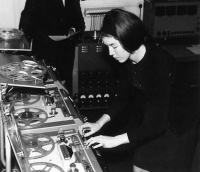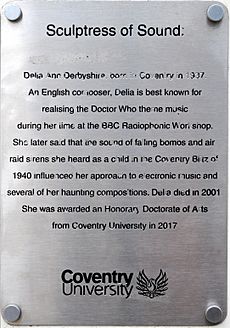Delia Derbyshire facts for kids
Quick facts for kids
Delia Derbyshire
|
|
|---|---|

Delia Derbyshire at the BBC Radiophonic Workshop
|
|
| Background information | |
| Birth name | Delia Ann Derbyshire |
| Born | 5 May 1937 Coventry, England |
| Died | 3 July 2001 (aged 64) Northampton, Northamptonshire, England |
| Genres | Electronic music, musique concrète, library music |
| Occupation(s) | Composer |
| Years active | 1959–2001 |
| Associated acts | White Noise, Unit Delta Plus |
Delia Ann Derbyshire (born May 5, 1937 – died July 3, 2001) was an English musician and composer. She was a pioneer in electronic music. Delia worked at the BBC Radiophonic Workshop in the 1960s. There, she created the electronic version of the famous Doctor Who theme music. Many people call her "the unsung heroine of British electronic music." She has inspired many musicians, including Aphex Twin and the Chemical Brothers.
Contents
Delia Derbyshire: A Pioneer in Electronic Music
Her Early Life and Education
Delia Derbyshire was born in Coventry, England. Her father worked with metal. She was a very smart child. By age four, she was already teaching other kids to read and write. She once said, "The radio was my education." Her parents bought her a piano when she was eight.
She went to Barr's Hill Grammar School. Later, she was accepted into both Oxford and Cambridge universities. This was a big achievement for a working-class girl in the 1950s. She won a scholarship to study mathematics at Girton College, Cambridge. After a year, she switched to music. She graduated in 1959 with degrees in both mathematics and music.
After university, Delia wanted to work with sound and music. She applied to Decca Records, a music company. But they told her they didn't hire women in their recording studios. So, she worked for the United Nations for a short time. She also taught piano and mathematics. Later, she worked for a music publisher called Boosey & Hawkes.
Making Music at the BBC
In November 1960, Delia joined the BBC. She started as a trainee assistant in a studio. She helped with a show that reviewed classical music. She was very good at finding exact parts of music on a record. People thought it was "magic."
She soon heard about the BBC Radiophonic Workshop. This was a special place where people made music and sounds using electronic equipment. Delia knew she wanted to work there. In April 1962, she joined the workshop. For eleven years, she created music and sounds for nearly 200 radio and TV shows.
The Famous Doctor Who Theme
One of Delia's most famous works was in 1963. She created the electronic version of the Doctor Who theme music. This was one of the first TV themes made entirely with electronics. When the composer, Ron Grainer, heard it, he was amazed. He asked, "Did I really write this?" Delia replied, "Most of it."
Grainer wanted to give her credit for her work. But the BBC had a rule that workshop members should remain anonymous. So, Delia was not officially credited on screen for many years. She finally received credit for her work in 2013. This was during the Doctor Who 50th anniversary special, The Day of the Doctor.
Delia's original theme was used for the first 17 series of Doctor Who, from 1963 to 1980. She also composed music for other BBC programmes. These included Blue Veils and Golden Sands and The Delian Mode.
Exploring New Sounds
In 1966, Delia teamed up with other electronic musicians. They formed a group called Unit Delta Plus. Their goal was to create and promote electronic music. They showed their music at different festivals.
Later, in the late 1960s, Delia formed another studio called Kaleidophon. She worked with Brian Hodgson and David Vorhaus. In 1968, they released an album as the band White Noise. Their first album, An Electric Storm, is seen as very important in electronic music.
Delia also created music for London theatre shows. She made sounds for a Royal Shakespeare Company production of Macbeth. She also contributed to the music for TV shows like The Tomorrow People and Timeslip. She even made sounds for a short film by Yoko Ono.
In 1973, Delia left the BBC. She continued to work on film soundtracks for a short time. By 1975, she stopped making music professionally.
Her Later Life and Legacy
After her music career, Delia worked in different jobs. She was a radio operator, worked in an art gallery, and in a bookshop. She later met Clive Blackburn, who became her partner for the rest of her life.
In 2001, Delia returned to music briefly. She provided sounds for a track called Sychrondipity Machine. This track was released after she died. Delia Derbyshire passed away in July 2001, at the age of 64, after an illness.
Her Archive and Influence
After Delia's death, many of her old tapes and papers were found. These were given to the University of Manchester to be saved. This collection includes her freelance work and some BBC recordings. It helps people study her amazing contributions to music. Her work continues to inspire new artists and composers.
Films and Plays About Delia
Delia Derbyshire's life and work have been shown in many plays and films:
- In 2002, BBC Radio 4 aired a radio play called Blue Veils and Golden Sands. It told her story.
- In 2009, a short documentary film about her, called The Delian Mode, was released. It won an award.
- In 2013, a TV show called An Adventure in Space and Time showed the early days of Doctor Who. Delia was a character in it.
- The BBC children's science show Absolute Genius with Dick & Dom explored how Delia created the Doctor Who theme.
- A play called Hymns for Robots about her working life was performed in 2018.
- A film by Caroline Catz, Delia Derbyshire: The Myths And The Legendary Tapes, was shown in 2017 and expanded into a feature film in 2020.
- The 2020 documentary Sisters with Transistors also talks about Delia's work.
Honours and Recognition
Delia Derbyshire has been honoured in several ways:
- In November 2016, her hometown of Coventry named a street "Derbyshire Way" after her.
- A blue plaque was put on her former home in Coventry in June 2017. This celebrated her as an important musician.
- In November 2017, Coventry University gave Delia a special honorary doctorate after her death. This was for her pioneering work in electronic music. The university also put up a plaque and a mural of her on one of their buildings.
See also
 In Spanish: Delia Derbyshire para niños
In Spanish: Delia Derbyshire para niños
 | Aaron Henry |
 | T. R. M. Howard |
 | Jesse Jackson |


